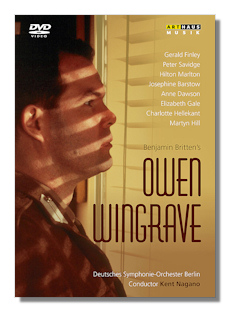
The Internet's Premier Classical Music Source
Related Links
- Britten Reviews
- Latest Reviews
- More Reviews
-
By Composer
-
Collections
DVD & Blu-ray
Books
Concert Reviews
Articles/Interviews
Software
Audio
Search Amazon
Recommended Links
Site News
 DVD Review
DVD Review
Benjamin Britten

Owen Wingrave
- Owen Wingrave - Gerald Finley
- Spencer Coyle - Peter Savidge
- Kate Julian - Charlotte Hellekant
- Lechmere - Hilton Marlton
- Miss Wingrave - Josephine Barstow
- Mrs. Coyle - Anne Dawson
- Mrs. Julian - Elizabeth Gale
- Sir Philip Wingrave - Martyn Hill
Westminster Cathedral Choir/Margaret Williams
Deutsches Symphony Orchestra Berlin/Kent Nagano
Filmed in 2001
Arthaus Musik DVD 100373 92m NTSC Widescreen Anamorphic PCM Stereo
This 2001 production is an opera film – that is, it is not a filmed performance taking place on a stage, but rather at various actual locations, like a movie. It was filmed for television broadcast, following the lead of the premiere of Owen Wingrave which was first presented on BBC2 on May 16, 1971. Britten wrote the work on a commission from the BBC. In 2005 I reviewed another Britten opera here that was also a given this same opera-film treatment, The Turn of The Screw (BBC Opus Arte OA0907D). I stated at the time that I found that production and filming method most effective. Let me quote an excerpt from that review:
In this production the viewer is given an imaginative motion-picture treatment of the opera, so that scene changes are generally seamless, and characters can sing in the background while on screen they merely ponder or deliberate.
In this production of Owen Wingrave, the singers perform most of the opera within the Wingrave home: upstairs, downstairs, in the dining room, in the "haunted room" and elsewhere. There are a few other set locations, including Hyde Park and rural locales. So the opera unfolds like a motion picture. Forget about curtains closing or lights dimming to affect a scene change. Presumably, retakes could even be inserted, and thus the end product is more real and better crafted.
The opera's libretto, by Myfanwy Piper, is based on the 1892 Henry James short story Owen Wingrave. In this production the story is updated to the 1950s. Owen is a member of a family with a long military history and is thus expected to make a military career for himself. He decides against this tradition and his family and friends constantly harass and insult him thereafter, hoping to shame him into changing his mind. Owen does not relent. One night Kate Julian, his girlfriend, calls him a coward and dares him to sleep in the "haunted room", the place where a Cromwell-era Wingrave ancestor slew his son for alleged cowardice and then was himself struck dead. Owen takes up her challenge and – well, I hesitate to ruin the ending for readers unfamiliar with the story. (Do not read the next sentence if you want to remain in suspense about the conclusion.) You may figure the ending out, however, once you ponder Owen's surname and Henry James' tendency to deliberately give obvious symbolic names to certain of his characters.
The singing and dramatic skills of the cast here are topnotch. Gerald Finley is excellent as the beleaguered and principled Owen. Peter Savidge as Coyle and Charlotte Hellekant as Kate Julian also turn in superb performances. Much of the singing is sort of in the sprechstimme style, and much else does not feature long lines or lush lyrical music. If you know Britten's style from works like The Turn of The Screw, you'll have an idea of what the instrumental and vocal music are like here. The work opens with Gamelan-style instrumental music: percussive and bell-like, it has an urgency and darkness about it, and periodically returns throughout the score. The dining scene (track 13) is positively riveting for the fanaticism of Owen's adversaries who badger him about his "scruples". Owen bravely stands up to them. The lighting, filming angles, acting and sets in this scene come together to create an utterly haunting and intense atmosphere.
Kent Nagano, a conductor I had previously not associated with Britten's music, leads a splendid performance and the Deutsches Symphony Orchestra respond with accurate and committed playing. The camera work and sound reproduction are first-rate, and other production values are also of the highest order. I first learned this opera from the early 1970s Decca recording that featured Britten himself conducting and Benjamin Luxon as Owen. I don't have that recording on hand for comparison now, but this new effort is strong in virtually every role and production aspect, and is the only video disc of the work available, thus making it a most desirable acquisition for fans of Britten and 20th-century opera.
Copyright © 2013, Robert Cummings





















